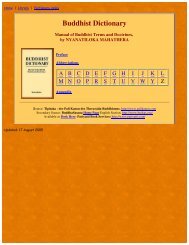The Three Basic Facts of Existence II: Suffering (Dukkha) - Buddhist ...
The Three Basic Facts of Existence II: Suffering (Dukkha) - Buddhist ...
The Three Basic Facts of Existence II: Suffering (Dukkha) - Buddhist ...
- No tags were found...
Create successful ePaper yourself
Turn your PDF publications into a flip-book with our unique Google optimized e-Paper software.
Noble Truth <strong>of</strong> <strong>Suffering</strong>? It can be termed the six bases in oneself for contact (ajjhattikâniâyatanâni). What six? <strong>The</strong> eye-base, ear-, nose-, tongue-, body-, and mind-base.” 80 More detailsare given at DN 22 and in the Sacca-Vibhaṅga. That this Truth is at the same time pr<strong>of</strong>ound andcomprehensive is stated in another Sutta: “In this Noble Truth <strong>of</strong> <strong>Suffering</strong> described by meimmeasurable are the shades and details, immeasurable the implications, <strong>of</strong> this term “NobleTruth <strong>of</strong> <strong>Suffering</strong>,” 81 and “It is impossible that anyone should say “I shall completely make anend to suffering without penetrating to the Noble Truth <strong>of</strong> <strong>Suffering</strong> according as it actually is,”82and again “It is impossible that any samaṇa or brāhmaṇa should say thus: “That is not the firstNoble Truth <strong>of</strong> <strong>Suffering</strong> taught by the samaṇa Gotama; ignoring that first Noble Truth <strong>of</strong><strong>Suffering</strong>, I shall describe another first Noble Truth <strong>of</strong> <strong>Suffering</strong>.” 83 To this thePaṭisambhidāmagga adds “<strong>Suffering</strong> has for its meanings <strong>of</strong> reality (tathatta: “undeceptiveness,“or “suchness”) the meaning <strong>of</strong> oppressing, meaning <strong>of</strong> being formed, meaning <strong>of</strong> burning(tormenting), meaning <strong>of</strong> changing.” 84 Ācariya Buddhaghosa states it formalistically thus: “(<strong>The</strong>Truth <strong>of</strong> <strong>Suffering</strong>) has the characteristic <strong>of</strong> afflicting. Its nature is to burn (torment). It ismanifested as occurrence … It also has the characteristic <strong>of</strong> occurrence … and <strong>of</strong> being formed.”85Unpleasant Feeling (Pain)General suffering, stated as the characteristic or as the Truth, is approachable also from theempirical subjective fact <strong>of</strong> pain, as in the case <strong>of</strong> a boil on the body or the pricking <strong>of</strong> a thorn. 86Feeling is divided into the three main classes <strong>of</strong> pleasure (sukha), suffering (dukkha) and neithersuffering-nor-pleasure(adukkhamasukha or “neutral feeling”), though it is also classed andsubdivided in many other ways too. 87 In one mode or another it is inseparable from allperception and consciousness, being the way in which consciousness perceives its objectaffectively. It has contact for its principal condition and is itself the principal condition forcraving (ignorance <strong>of</strong> the four truths being present). Craving may be regarded as the dynamicelement that, when supported by ignorance, resists suffering and lusts after pleasure. But allfeeling is impermanent, and so craving has constantly to renew its search for pleasure and flightfrom suffering. “Pleasant feeling is pleasant in virtue <strong>of</strong> presence and unpleasant in virtue <strong>of</strong>change; unpleasant feeling is unpleasant in virtue <strong>of</strong> presence and pleasant in virtue <strong>of</strong> change;neutral feeling is pleasant in virtue <strong>of</strong> knowledge and unpleasant in virtue <strong>of</strong> non-knowledge…” 88 In order to understand this passage we must have recourse to the subcommentary.“Pleasant feeling is pleasant owing to presence as persistence, not merely owing to the presencesub-moment(ṭhiti-kkhaṇa) … and it is unpleasant owing to its change as its having gone away,not merely owing to the cessation-sub-moment (nirodha-kkhaṇa); … for the stopping <strong>of</strong> pleasantfeeling seems unpleasant to those who do not fully know the facts … Similarly with the change<strong>of</strong> unpleasant feeling; … for the stopping <strong>of</strong> unpleasant feeling seems pleasant to creatures sincethey say “What a pleasure to be cured <strong>of</strong> that sickness!” <strong>The</strong>n “knowledge” (in the case <strong>of</strong>neutral feeling) is awareness (avabodha) according to true individual essence; for when someoneknows neutral feeling he has pleasure because <strong>of</strong> its subtleness, just as awareness, according to80SN 56:14/S V 426.81SN 56:19/S V 430.82SN 56:44/S V 452.83SN 56:16/S V 428.84Saccakathá, Paþis <strong>II</strong> 104.85Vism Ch. 16, p. 495–6.86Vibh-a 49. It may be noted that the word vedaná is one <strong>of</strong> the derivatives <strong>of</strong> the root vid—to know—here in the sense <strong>of</strong> affective knowledge.87see e.g. SN 36:19, 22, and 29.88MN 44/M I 303.44
















